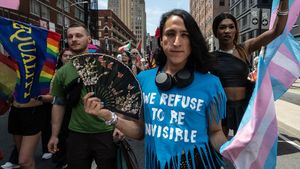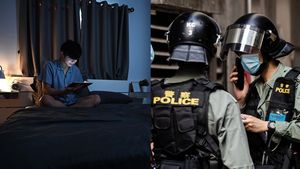In the appropriate excitement of the first-ever mention of the words "lesbian," "bisexual," and "transgender" in a State of the Union address, what might have gone unnoticed was the context in which President Obama used them.
Referring to U.S. foreign policy, the president said, "As Americans, we respect human dignity, even when we're threatened." The president addressed the importance of rejecting anti-Semitism and Islamophobia, defending free speech, advocating for political prisoners, and protecting vulnerable populations -- including women, religious minorities and lesbian, gay, bisexual, and transgender people -- from persecution. And then he said perhaps some of the most important words of the evening, "We do these things not only because they are the right thing to do, but because ultimately they will make us safer."
These words are important because they proclaim that protecting individuals, based on who they are -- based on their identity -- is in the national security interests of the United States. Why would the president say that protecting LGBT people and others contributes to the safety and security of the American people?
Over the years, advocates have fought hard to expand the global consensus about whose rights are protected under the umbrella of the Universal Declaration of Human Rights. While framed in broad, all-encompassing terms, the Declaration was originally adopted by the still-new United Nations in 1948, partially in response to the hatreds that drove World War II and persisted after the war. And in the succeeding six decades, the UDHR has served as the foundation for the global drive toward equality.
We have come a long way since the adoption of the UDHR. Former Secretary of State Hillary Clinton -- echoing her words as first lady in 1995 at the Beijing Women's Conference when she famously declared that "women's rights are human rights" -- broke through a similar ceiling at the U.N. Human Rights Council in December 2011 with her assertion that "gay rights are human rights." She continued, "Like being a woman, like being a racial, religious, tribal, or ethnic minority, being LGBT does not make you less human. ... Being gay is not a Western invention. It is a human reality."
On both occasions, Secretary Clinton was not the first, but she was the highest-ranking U.S. official to elevate the issues in this way. But even this groundbreaking wording was framed as the need to "do the right thing" and to be on the "right side of history."
In recent years, thinking about human rights protection has developed in another direction as well. There has been a growing recognition that U.S. national security is derived not only from our country's military strength but that equality, stability, and peace are most often found accompanying democratic and inclusive political systems that respect human rights and the rule of law.
In 2010 the Obama administration's national security strategy stated that the U.S. supports the expansion of democracy and human rights, and that "their success abroad fosters an environment that supports America's national interests." In 2012 the president created an Atrocities Prevention Board to help coordinate the U.S. government's response to genocide. He said, "Preventing mass atrocities and genocide is a core national security interest and a core moral responsibility of the United States," and explained it thus: "Our security is affected when masses of civilians are slaughtered, refugees flow across borders, and murderers wreak havoc on regional stability and livelihoods."
As a matter of policy, we have seen the evolution of U.S. support for democratic movements and the prevention of genocide and mass atrocities, among other things, as a stated means to protect our national security. A secure international framework of nations helps to promote world peace. The need to engage, empower, and protect persecuted minorities is not only the responsibility of specific countries, it is a global responsibility.
So what happened last Tuesday was important for more than one reason. First, President Obama chose the elevated platform of the State of the Union to recognize the rights LGBT people in the United States and around the world (not just once, but three times throughout the speech). And he also stated, in no uncertain terms, that protecting the human rights of individuals in persecuted minority groups, including LGBT people, should be a national security priority.
For many of those watching, the State of the Union may have been an annual political highlight; but for some others, it signaled another milestone in the maturing human rights movement. By including the rights of LGBT individuals as part of our national security interests the president has created a new opportunity to fight for equality for all, regardless of sexual orientation or gender identity.
JEAN FREEDBERG is the deputy director of Human Rights Campaign Global.









































































